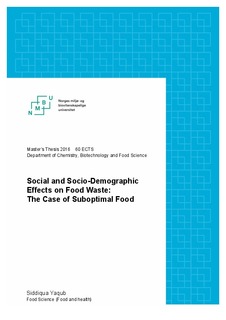| dc.contributor.advisor | Oostindjer, Marije | |
| dc.contributor.advisor | Egelandsdal, Bjørg | |
| dc.contributor.author | Yaqub, Siddiqua | |
| dc.date.accessioned | 2016-08-10T08:01:25Z | |
| dc.date.available | 2016-08-10T08:01:25Z | |
| dc.date.issued | 2016-08-10 | |
| dc.identifier.uri | http://hdl.handle.net/11250/2398572 | |
| dc.description.abstract | I løpet av de siste årene, har det vært økt oppmerksomhet rettet mot matsvinn. FAO har estimert 1.3 milliarder tonn matsvinn årlig, hvorav forbrukerne er ett av de største bidragsyterne. Den negative belastningen matsvinn påfører miljøet, den manglende forståelsen bak handlingen og atferden rettet mot matsvinn, og den ujevne fordelingen av mat i verden, har bidratt til økt forskning innenfor dette feltet. Denne type forskning bidrar med å øke forståelsen bak årsakene til matsvinn, som videre kan bidra med å igangsette initiativ og konkrete handlinger for å redusere mengde matsvinn i husholdninger.
Ett av hensiktene i denne oppgaven var å vurdere påvirkningen av sosiale forhold og demografiske faktorer på matsvinn i husholdningen, samtidig som å studere årsakene bak matsvinn, og motivasjonene til å redusere matsvinn. Forbrukernes holdninger mot sub-optimale matprodukter ble også studert. Hvorvidt deres holdninger mot sub-optimale produkter ble endret basert på informasjon om den sosial normen, og hvor miljøbelastende matsvinn kan være, ble også studert. | nb_NO |
| dc.description.abstract | During the past few years, there has been increased awareness and attention towards food waste and food waste management worldwide. FAO estimates approximately 1.3 billions tonnes of food being wasted throughout the food supply chain annually, where food waste from households is one of the main contributors in developed countries. The environmental impact of food waste, the lack of understanding of food waste behaviour, and the unequal distribution of food globally, have led to extensive research in this field. Research conducted on this topic, contribute in increased understanding of reasons behind food waste and food waste behaviour, which furthermore contribute in initiating actions to reduce food waste in households.
The purpose of this thesis is to examine the influence of demographic factors and social context on estimated food waste in households. Additionally, the reasons behind food waste and the drivers to reduce food waste are also studied. Furthermore, by analysing consumers’ perception towards suboptimal food, and the influence of different messages on these perceptions and food waste behaviour, also gives an insight in consumers’ food waste behaviour. | nb_NO |
| dc.language.iso | eng | nb_NO |
| dc.publisher | Norwegian University of Life Sciences, Ås | |
| dc.subject | Food waste | nb_NO |
| dc.subject | Suboptimal Food | nb_NO |
| dc.subject | Social Effect | nb_NO |
| dc.subject | Demographic Effect | nb_NO |
| dc.title | Social and socio-demographic effects on food waste : the case of suboptimal food | nb_NO |
| dc.type | Master thesis | nb_NO |
| dc.subject.nsi | VDP::Technology: 500::Food science and technology: 600 | nb_NO |
| dc.source.pagenumber | 93 | nb_NO |
| dc.description.localcode | M-MAT | nb_NO |
